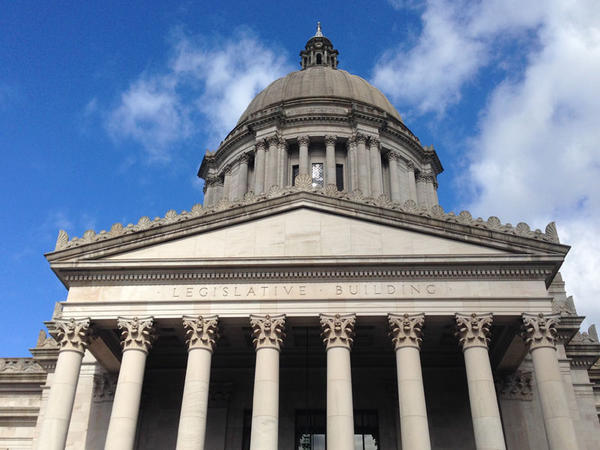
Washington Lawmakers Once Again Unlikely To Finish Work On Time
Listen
In what has become the new normal, Washington state lawmakers are expected to go into an overtime session because they’ve been unable to agree on a state operating budget or a plan to fully fund public schools.
The regular 105-day session ends Sunday, April 23.
Democratic Gov. Jay Inslee will have the option of immediately calling lawmakers back into special session for 30 days, or he could choose to wait to declare a special session until budget writers are closer to having an agreement.
“We have not made decisions about that yet,” Inslee said Monday following a bill signing ceremony. “I’m going to do whatever is going to get the best deal for the kids of the state of Washington the fastest.”
Asked about the timing of a special session, Republican Senate Majority Leader Mark Schoesler said, “I’m ready to go to work the next day or whatever the governor would like.”
Down to the wire… again
Both the Democratically-controlled Washington House and the GOP-led state Senate have already passed their own budget proposals. But negotiations on a final, bipartisan deal have yet to begin in earnest.
Senate Republicans have said negotiations can’t begin until House Democrats pass their proposed $3 billion tax package — something Democrats say they have no intention of doing until there’s a final budget deal.
The stalemate shows no signs of resolving in these final days of the session.
Special sessions have become the norm in Olympia in recent years. The last time Washington lawmakers finished their work on time in a 105-day, budget writing session was in 2009.
It took two special sessions and 150 days in 2011. That was when Democrats still controlled both chambers. In 2013, it took 156 days and three special sessions. In 2015, lawmakers met for 176 days and didn’t adjourn until July 10.
The cost of a legislative special session can vary greatly depending on whether all lawmakers are in Olympia or just budget negotiators. In 2015, the Washington House and Senate combined spent $669,446 on special sessions. That included per diem and mileage for legislators and their assistants plus temporary session staffing.
“I don’t think this should be standard operating procedure,” Inslee said of the pattern of special sessions year after year. He urged Senate Republicans to begin budget negotiations.
“I’m hopeful that they realize that they’re free to criticize the Democrats as much as they want, but we need to get negotiations going to get this job done.”
‘We’ll be here a lot longer than we should be’
Last week, Senate Republicans insisted that budget negotiations can’t happen until House Democrats pass their tax package.
“How do you do it when they won’t vote their taxes off the floor?” said Republican Sen. Dino Rossi, vice chair of the Senate Ways and Means Committee.
This week, Republicans reframed the problem as a lack of agreement on how much the next budget should spend specifically on education and where that money would come from.
“You have to know what education costs,” said Schoesler noting that K-12 spending will represent more than half of the next budget. “We have to know how we’re going to pay for it.”
A bipartisan education funding task force has been meeting in recent weeks to hammer out the details of K-12 spending. But Democratic House Majority Leader Pat Sullivan said negotiations on the remaining parts of the budget, like mental health and early learning, shouldn’t wait for that work to be completed.
“I don’t think you hold the budget hostage to education funding,” Sullivan said. “But putting off the negotiations on other parts of the budget means we’ll be here a lot longer than we should be.”
Different tacks on education
Lawmakers must act this year to fully fund education and take the pressure off local school levies because of the Washington Supreme Court’s 2012 decision in the McCleary case. It requires the state to amply fund schools by the 2018 school year.
The state is currently in contempt of court and accruing a $100,000-a-day fine for failing to comply with the court’s requirements in the McCleary case.
The House and Senate have taken very different approaches to resolving McCleary.
House Democrats passed a $44.9 billion two-year budget that relies on a new state capital gains tax, as well as changes to the state’s business and occupation and real estate excise taxes, to fully fund schools and avoid cuts to social services.
Senate Republicans passed a $43.3 billion budget that depends on a new state property tax levy of $1.55 per $1,000 of assessed property value to replace local maintenance and operation school levies. The Republican budget would also cut some social services.
Both sides claim their plans would put about $2 billion more into public schools over the next two years.
Critics of the Democrats’ plan say the capital gains tax is a volatile and undependable way to fund schools. Opponents of the Republicans’ so-called levy swap say it wouldn’t net schools that much new money because of the elimination of local levies.
9(MDAyNTQ1NzQ1MDEyMjk0OTcxNTI4MzljZQ001))
Related Stories:

Head Start serves 15,000 kids in Washington. And its regional office just closed.
The regional Head Start office closed this week, making some advocates nervous about the program’s future. (Credit: Barnaby Wasson / Flickr Creative Commons) Listen (Runtime 1:00) Read The regional Head

Astronauta de la NASA José Hernández inspira a estudiantes durante visita a Tri-Cities
EL astronauta de la NASA José Hernández visitó el este de Washington y compartió su historia de resiliencia y determinación con estudiantes locales.

Washington, Idaho rank high for public health emergency preparedness
Both states saw steady or increased funding for public health, but Idaho still among lowest for vaccinations.












